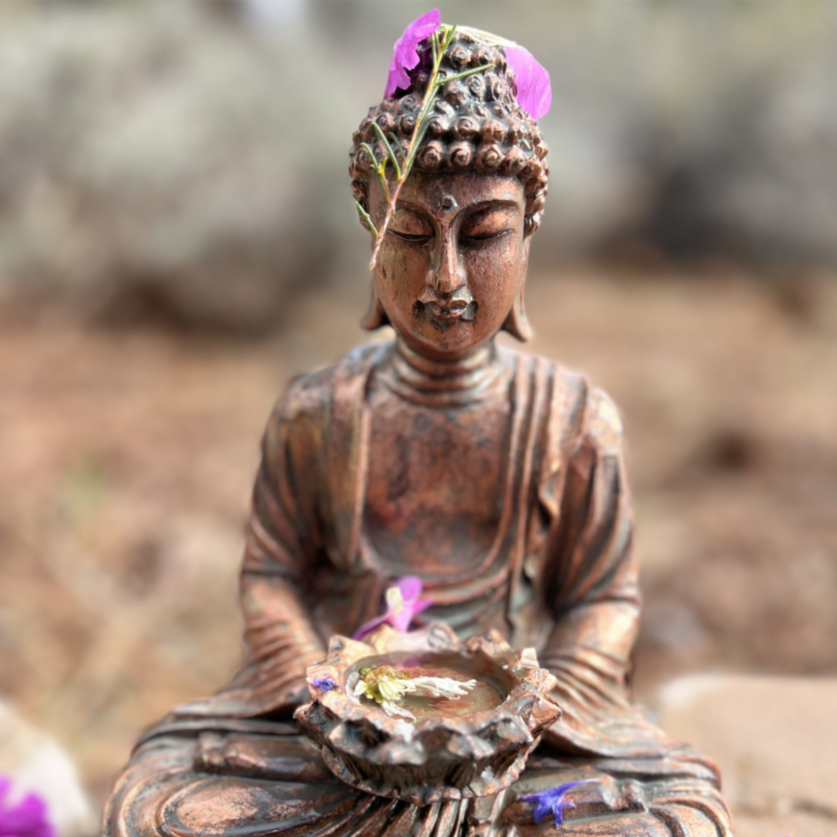THE PRACTICE OF DANA (GENEROSITY)
About Dana (Generosity) in General
And what is the accomplishment of generosity? Here, [one] dwells at home with a mind free from stinginess, freely generous, open-handed, delighting in relinquishment, one devoted to charity, delighting in giving and sharing.
The spirit of generosity is a foundational component to the Buddhist path. It supports the development of lovingkindness and compassion, deepens awareness of our interconnectedness and encourages non-attachment. In the Buddhist tradition, there is a concept called ‘Dana’ which can be translated into generosity or donations. In this concept is both the generosity of giving, as well as the generosity of receiving.
In general, this is a personal practice (within community), that is situational and personal in nature. It is meant to be an inquiry of generosity from the heart, in whatever form that means to you.
About Dana (Generosity) at Big Bear Retreat Center
While Big Bear Retreat Center is not tied to any lineage or denomination, we embrace the practice of Dana as a concept. Our values of offering a space that is accessible, inclusive, and a place for belonging guide us on this concept.
Nobody is turned away due to finances.
At Big Bear Retreat Center, there are a few ways Generosity is expressed and available.
- Financial support for all retreats, nobody is turned away due to finances
- Flexible pricing options with low and high price options based on lodging choices and needs (we are constantly looking to improve this range of options)
- We also offer a variety of retreats at alternate pricing options, such as Dana-based registration fees and Sliding scale self-selection pricing options
- Options to donate and contribute to our scholarship fund at registration (at any amount)
- For most of our meditation retreats, as is traditional in the insight tradition, there is the opportunity to offer Dana (generosity) to the teaching team
If you’d like to know more, please visit our FAQ or contact us at guestservices@bigbearretreatcenter.org.
Teacher Dana
As part of this tradition, many meditation teachers offer their teachings without set fees or compensation. BBRC reimburses teachers’ travel costs and provides teachers with meals and accommodations while teaching, but for teacher-dana style retreats, teachers receive no direct compensation from the retreat center. As a practice of generosity from the heart, participants are invited to offer “teacher dana” (donations-generosity) to the teachers at the end of the retreat. When we all take part in the offering and receiving of dana, we join a large circle of generosity.
Note: Teacher dana is NOT included in registration fees (unless noted otherwise).
To learn more about dana at other centers, you can read about this and the tradition from IMS.


Dana-based Registration Fees
Some of our retreats are offered as Dana-based Registration Fees. This means that the registration fees are offered at any amount (above zero) to attend the retreat. Similar to above, there are no set expectations or minimums. Whatever is generous is a personal inquiry. If needed, you can view other retreats to see what our costs are typically. But please, do not be limited in any way.
Note: Dana-based registration fees do NOT include teacher dana. There is a separate option to offer dana to teachers at the end of retreat.
To learn more, you can read about the Dana of Dana Retreats by Gil Fronsdale
Dana is not just generosity in the material form. Dana is the generosity that comes from the heart, in its truest most genuine form. It’s a practice, really. To be generous from the heart, from the spirit. To best describe this concept, we turn to Gil Fronsdal, senior teacher and founder of Insight Meditation Center (IMC) and Insight Retreat Center (IRC), to more clearly articulate this teaching and concept.
The practice of giving, or dana in Pali, has a pre-eminent place in the teachings of the Buddha. Dana refers to the act of giving and to the donation itself. The Buddha used the word cage to refer to the inner virtue of generosity that ensures that dana is connected to the Path. This use of cage is particularly significant because it also means “relinquishment” or “renunciation.” An act of generosity entails giving more than is required, customary, or expected relative to one’s resources and circumstances. Certainly it involves relinquishment of stinginess, clinging and greed. In addition, generosity entails relinquishing some aspects of one’s self-interest, and thus is a giving of one’s self. The Buddha stressed that the spiritual efficacy of a gift is dependent not on the amount given but rather on the attitude with which it is given. A small donation that stretches a person of little means is considered of greater spiritual consequence than a large but personally insignificant donation from a wealthy person.
Buddhist teachings emphasize that the manner in which we give is as important as what we give-we should give with respect, with happiness and joy. When we are practicing generosity, and it does not bring happiness and joy, we should pay close attention to our motivations for giving, and perhaps even re- evaluate whether to give at all.
The freedom of the Buddha is the freedom from all forms of clinging, and the most obvious antidote to clinging is letting go. Because giving certainly involves letting go, it develops our capacity to relinquish clinging. However, the practice of giving entails much more than letting go. It also develops qualities of heart such as generosity, kindness, compassion and warmth. Thus, giving leads us to the heart of Buddhist practice, while helping our practice to be well rounded and heartfelt.
Generosity is not limited to the giving of material things. We can be generous with our kindness and our receptivity. These forms of generosity are clearly not related to wealth. Generosity can mean the simple giving of a smile or extending ourselves to really listen to a friend. Paradoxically, even being willing to receive the generosity of others can be a form of generosity.
